2013 Research Seminars
| Centre for Writing and Society & Philosophy @ UWS Convener: Dr Jess Whyte | ||
Time: 3.30 - 5.00 pm / Venue: Bankstown Campus, 3.G.54 |
Anna Yeatman, "The Politics of Human Rights" (30th October)
Abstract
The contemporary cosmopolitan and anti-statist conception of human rights is taken by its advocates and some of its critics to be the only conception of human rights. Yet we should heed the anti-statist nature of this discourse for it betrays an awareness that there
is another, alternative discourse of human rights, one that centres on the idea of sovereignty. This paper is given to the specification of this alternative anti-statist discourse of human rights, and to the argument that this can be the only defensible conception of human rights.
Bio
Anna Yeatman is currently a professorial research fellow attached to the Whitlam Institute at the University of Western Sydney. She is currently working on a suite of activities within the Human Rights and Public Life program. From 2008-2012 she was the director of the
Centre for Citizenship and Public Policy at UWS. Before this she was a Canada Research Chair in Political Science at the University of Alberta (2003-8), and before that she was the Chair of Sociology at Macquarie University (1993-2003). Recent publications include: Individualization and the Delivery
of Welfare Services (2009), and two co-edited collections, State, Security and Subject Formation (Continuum 2010) and Action and Appearance: Ethics and the Politics of Writing in Hannah Arendt (Continuum 2011). She is working on a set of essays on contemporary civil philosophy.
She is also a trained Feldenkrais practitioner who sustains a modest Awareness through Movement (ATM) and Functional Integration (FI) practice.
John Hadley, "Animal rights advocacy and legitimate public deliberation" (16th October)
Abstract
In this paper I offer a response to recent debate over 'direct action' animal advocacy and public deliberation in liberal democracies. Mathew Humphrey and Marc Stears (2006), and Stephen D'Arcy (2007) have argued that liberal democracies ought to tolerate direct action
animal advocacy in the interests of promoting the right of proponents of nonmainstream views to inform public deliberation and decision-making. I argue that the precise scope of Humphrey and Stears and D'Arcy's analyses is unclear and important parts of their theory are underdescribed. I highlight the
logical and practical implications of their claim that direct action is useful as a means of overcoming the stifling influence of conventional wisdom. I conclude by arguing that tolerance for direct action advocacy ought not to extend to controversial animal rights campaigning tactics such as making
threats, using incendiary devices and damaging property.
Bio
John Hadley is a Research Lecturer in Philosophy in the School of Humanities and Communication Arts at the University of Western Sydney. He was formerly a lecturer in philosophy in the School of Humanities and Social Sciences, and Lecturer in Communication Ethics in the
School of Communication, Charles Sturt University. During his PhD candidature at the University of Sydney, John lectured in the philosophy department and was a guest lecturer for USYD Laboratory Animal Services. He has published on a wide range of topics in animal and environmental ethics, including
recent papers on assisting wild animals in need, animal rights extremism, the reporting of animal research in the media, and the ethical limits of veterinary expenditure. He has refereed for journals such as Journal of Applied Philosophy, Journal of Value Inquiry, Social Theory and Practice, Political
Studies, Environmental Values, and Environmental Philosophy.
Diego Bubbio, "Hegel, the Trinity, and the I" (2nd October)
Abstract
The main goal of this paper is to argue the relevance of Hegel's notion of the Trinity with respect to two aspects of Hegel's idealism: the overcoming of subjectivism and his conception of the I. I contend that these two aspects are interconnected and that the Trinity
is important to Hegel's strategy for addressing these questions.
I first address the problem of subjectivism by considering Hegel's thought against the background of modern philosophy. I argue that the recognitive structure of Hegel's idealism led him to give the Trinity a decisive role in his philosophical account. Next, I discuss the Trinity by analysing the three divine persons. This analysis paves the way for the conclusion, where I argue that the Trinity represents a model for re-thinking the I in a way that overcomes a "naïve realist" and a "subjective" account of the self. I suggest that Hegel's absolute idealism can be conceived as an approach to the I that considers the role of acts of mutual recognition for the genesis of self-conscious thought, and that the Trinity is the Darstellung of the relational and recognitive structure of the I.
Biography
Paolo Diego Bubbio has a BA (Hons) in Philosophy and Literature and a Ph.D in Philosophical Hermeneutics from the University of Turin (Italy). He was Contract Researcher, University of Turin, 2003-2004; Research Fellow, Heythrop College (University of London), 2004-2005;
Visiting Fellow, University of Warwick, 2008; Professore a Contratto (Visiting Professor), University of Turin, 2005-2009. In 2006 he moved to Australia to take up a Postodoctoral Fellowship in Philosophy at The University of Sydney. In 2009 he was awarded an Australian Postoctoral Fellowship from the
ARC on a joint project (together with Prof Paul Redding) on 'The God of Hegel's Post-Kantian Idealism'. In 2011 he got an ARC Future Fellowship and joined the School of Humanities and Communication Arts at UWS as Senior Research Fellow.
Marcelo Svirsky (UOW), "After Israel - On Subjectivity and Profanation" (18th September)
Abstract
Analyses of colonial events such as the event of Israel in Palestine are inclined to engage with political solutions, as if sophisticated conceptualisations of sovereignty and exchanges of land and borders will save us. But no political solution can provide the cultural
marrow utterly necessary to substantiate a thorough transformation of ways of life – without which colonial domination reproduces itself. Forget then, about two-states or one-state. Disabling colonial domination, I argue in this presentation, is first and foremost about the transformation of colonial
subjectivities. However, to rescue the study of subjectivity from the traps of the dark sides of power, processes of subjective constitution need to be read through the lens of profanatory action. In this philosophical undertaking Giorgio Agamben's notion of profanation and his call to profane the sacred
– our own subjectivities – in the most desacralised forms proves beneficial if conceived as a process of becoming. As a corollary, aftering Israel means profaning the complicity between the subject of theory and the Zionist subject; namely, it is about disarming the resonance between
the prioritisation of the political paradigm over the cultural paradigm on the one hand, and the colonial subject that this prioritisation reproduces on the other hand.
Biography
Marcelo Svirsky is a Lecturer in International Studies at the School of History & Politics in the University of Wollongong. He has recently published Arab-Jewish Activism in Israel/Palestine (Ashgate, 2012), Agamben and Colonialism (Edinburgh University
Press, edited with Simone Bignall, 2012), and a special issue of Deleuze Studies, Deleuze and Political Activism (Edinburgh: Edinburgh university Press, 2010). His forthcoming books are: After Israel – Towards Cultural Transformation (Zed Books, 2013), and Collaborative Struggles in Settler-Colonial Societies
(ed.), Settler Colonial Studies, Special Issue (Routledge - Taylor & Francis Group, 2014).
Giovanna Miolli (UNIPD), "The Relationship between Truth and Certainty in Hegel's Conception of Truth" (4th September)
Abstract
The paper attempts to clarify a fundamental aspect of the concept of 'philosophical truth' proposed by Hegel. In particular, it is claimed that this concept is inclusive of the further notion of 'certainty'. To put it more precisely, the philosophical truth is to be understood
as the identity between truth and certainty. This position presents important implications concerning the relation between ontology and epistemology.
The paper proceeds as follows. The first part aims at noting an interesting correspondence between the last chapter of the Phenomenology and
the Introduction to the Science of Logic that specifically addresses the topic we are investigating. The second part deals with the clarification and internal articulation of the terms at stake with respect to the Hegelian horizon. It will be suggested how to intend both 'truth' and 'certainty'. Furthermore,
some references to certain contemporary positions that face the truth-certainty matter will be added. Based on the considerations presented in the previous sections, part three tries to show how to reintegrate the preceding definitions of 'truth' and 'certainty' into their identity, and therefore to
highlight the speculative move Hegel realises. Taking seriously the Hegelian proposal, the conclusion emphasises some suggestions regarding the relationship between ontology and epistemology that the contemporary theories of truth should take into account.
Biography
Giovanna Miolli is a PhD student in Philosophy at the University of Padua (Italy). Her PhD research project focuses on the concept of truth in Hegelian philosophy. She graduated under the supervision of Prof. Franco Chiereghin, during her Master's thesis she started to
investigate the truth topic, mainly with reference to Hegel's Phenomenology of Spirit. Her latest research interests also include the recent debate on metaphysical and non-metaphysical interpretations of Hegel's philosophy and the study of actual theories of truth within the field of analytic philosophy.
Des Manderson (ANU), "Three Scenes from the Scopic Regime of Sovereignty" (7th September)
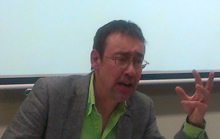
Presenter: Professor Desmond Manderson
Abstract
The camera introduces us to unconscious optics as does psychoanalysis to unconscious impulses'—Walter Benjamin. Visual culture is subject to 'scopic regimes' which, at different times and places, govern how we read and make sense of images. Since the US Civil
War, the photography of war has played a pivotal role in constructing these regimes. But the relationships between image, spectator, and subject have not remained static. Tracing these structural and aesthetic transformations allows us to understand how changing scopic regimes differently frame the justification,
implications, and limits of the exercise of sovereign power and more generally organise our on-going relationship to legal authority and our own legal subjectivity. How violence and death abroad is depicted and mediated is not unrelated to how it is depicted and mediated in everyday life; the images
that present the exercise of sovereign power in war are not unrelated to the terms on which it may be questioned at home. This essay focuses on three episodes from that history, focusing on the sharpest contrasts and developments in the visual discourse of sovereignty—between the US Civil War and
World War I, on the one hand, and between those two periods and contemporary representations of war on the other. Together the dimensions of temporality, affect, and judgment position the viewer in relation to sovereign violence and help to construct social norms around sovereignty, accountability, and
responsibility. In particular the function and structure of war imagery has notably modified in recent years, implicating us in profoundly new relationships to politics, technology, and sovereignty.
Biography
Desmond Manderson is a pioneering figure in interdisciplinary scholarship in law and the humanities.
He is the author of several books including From Mr Sin to Mr Big (1993); Songs Without Music: Aesthetic dimensions of law and justice (2000); Proximity, Levinas,
and the Soul of Law (2006); Essays on Levinas and Law (2009); and Kangaroo Courts and the Rule of Law—The legacy of modernism (2012). He has written about and lectured in literature, philosophy, ethics, public policy, history, cultural studies, musicology, human geography, and anthropology, as
well as in law and legal theory. Throughout this work Manderson has articulated a vision in which law's connection to these humanist disciplines is critical to its functioning, its justice, and its social relevance. After ten years at McGill University in Montreal, where was Canada Research Chair in
Law and Discourse and inaugural Director of the Institute for the Public Life of Arts and Ideas, he returned to Australia in 2012 to take up a Future Fellowship at ANU, where he is jointly appointed in the ANU Research School of Humanities & the Arts and in the ANU College of Law.
Jon Roffe (UNIMELB), "From the Labour Theory of Value to the Philosophy of Market Price" (15th May)
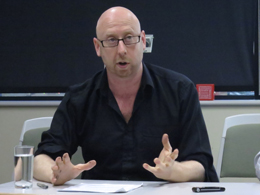
Abstract:
This paper presents one piece of a broader effort to elaborate what I would like to call abstract market theory, an immanent theory of the market. Here, I will consider two challenges to the possibility of such a theory that arise from Marx's work, namely the labour theory
of value, and the opposition he advances (notably in book three of Capital and Theory of Surplus Value) between real capital and fictitious capital.
The central contention I would like to advance is that while Marx is right to assert that the labour theory of value accounts for the advent
of the element of price (and thus the market, on my definition), it does not account for the ongoing subsistent reality of the market, which is integrally the regime of price. I will argue that the market as it now exists in no way intrinsically concerned with issues of value, but with a pricing-process
that is real without being anchored in material reality – which is to say that the market has no mirror and is not a double of any underlying real economy. I will argue for this conclusion by considering the history and functioning of financial derivatives themselves, which I will assert (following
Elie Ayache) to be the royal road to a philosophy of the market.
Biography:
Jon Roffe is a McKenzie Postdoctoral Fellow at the University of Melbourne. He is one of the editors of the journal Parrhesia (opens in a new window), and the author of Badiou's Deleuze (Acumen 2012), the book of aphorisms
Muttering for the Sake of Stars (Surpllus 2012) and, with AJ Bartlett and Justin Clemens the forthcoming Lacan Deleuze Badiou (EUP 2013).
Audio: Download the audio for the seminar or play below
Mark Kelly, "On the Persistence and Obsolescence of Marxism: May Day Reflections on Class Politics" (1st May)
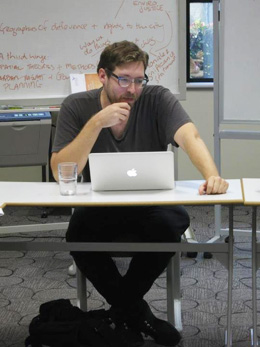
Abstract:
Despite the widespread announcement of the demise of Marxism by liberals, conservatives, and ex-Marxist thinkers who have labelled themselves 'post-Marxist', Marxism persists, both as a tendency in politics and as a theoretical paradigm. Drawing on the thought of Louis
Althusser and Michel Foucault, I will argue, against post-Marxists like Laclau and Mouffe, that this persistence can be explained by the continuing existence of class struggle in our society. I will nonetheless follow Althusser and Foucault in arguing that some elements of Marxism, including its exclusive
emphasis on class, are indeed redundant, and will thus advocate a non-Marxist approach class politics.
Biography:
Mark Kelly is Adjunct Fellow and an associate member of the Philosophy Research Initiative at Western Sydney University. He was previously Lecturer in Philosophy at Middlesex University. He is the author of The Political Philosophy of Michel Foucault (Routledge, 2009)
and Foucault's History of Sexuality Volume I (Edinburgh, 2013).
Audio: Download the seminar recording or play below
Jo Faulkner (UNSW), "Security from Moral Ambiguity: the 'gray zone' and the Child Witness in Catastrophe Literature" (3rd April)
Abstract:
In recent decades the figure of the child witness has become prevalent in catastrophe literature. The child's putative innocence renders it an attractive site of identification for readers anxious about their own complicity in moral disaster. But the child's ability to
epitomize suffering also informs a particular theoretical deployment of "infancy," as an incapacity of expression that has come to mark contemporary understandings of witnessing and our ethical responsiveness to catastrophe. With reference to Agamben, Levi, and trauma theory, this paper begins to interrogate
the possibility of a responsibility grounded in moral ambiguity and apprehension of one's own "infancy."
Biography:
Joanne Faulkner is an ARC DECRA Fellow in Philosophy, the School of Humanities, UNSW. She is the author of The Importance of Being Innocent (Cambridge UP, 2011) and Dead Letters to Nietzsche, or the Necromantic Art of Reading Philosophy (Ohio UP, 2010), co-author of
Understanding Psychoanalysis, and has published articles in Angelaki, Theory and Event, Hypatia, and Critical Horizons, among other journals. Her specific research area at present is the political ontology of childhood.
Vanessa Lemm (UNSW), "A Biopolitical Reading of the Philosophical Life in Michel Foucault's Le courage de la vérité" (20th March)
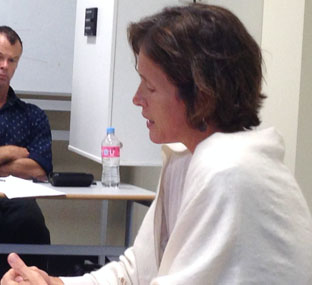
Abstract:
This paper investigates the relation between truth and the philosophical life in Michel Foucault's Le courage de la vérité from the perspective of the Nietzschean question: how truth can be incorporated or embodied (einverleibt)? In contrast to the Arendtian idea that
the philosophical life was a life that allowed a distance to the body, in order to avoid the problem of totalitarianism, the filling of the empty place of power or sovereignty by the "body" of the People, or what Esposito calls the closure of the political body on itself, this papers argues that in Foucault,
and in particular, in his analysis of the philosophical life of the cynics, we finds an idea of the philosophical life where truth is incorporated or embodied. Here the immunitary and communitary resources of embodiment are shown to be necessary for the uniting of life (zoe) and philosophy so as to make
possible a form of life (bios) that resists and overcomes the totalitarian government of life.
Biography:
Prof Vanessa Lemm (UNSW) is the author of Nietzsche's Animal Philosophy: Culture, Politics and the Animality of the Human Being (New York: Fordham 2009, Spanish trans. with Ediciones Universidad Diego Portales, Santiago de Chile, 2011; German trans. with Diaphanes, Berlin/Zuerich,
2012). She has published a great number of articles on Nietzsche and contemporary political thought. She is currently working on the notion of justice in Nietzsche and Heidegger as well as the relation between life and community in Nietzsche and Esposito.
Peter Banki, "What is Properly Romantic" (6th March)
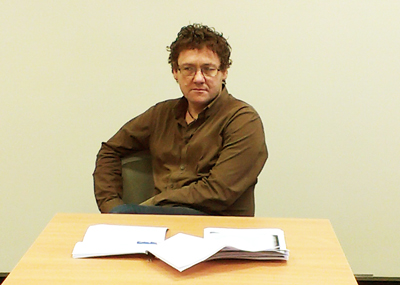
Abstract:
In this paper, I will explore this question and the irony that is proper to it through the celebrated readings of Walter Benjamin, Lacoue-Labarthe and Nancy, Paul de Man and others. Particular attention will be paid to a chapter in Friedrich Schlegel's novel Lucinde (1798)
and his essay "On Nonunderstanding" (Über die Unverständlichkeit) (1800), which was the final piece included in the journal The Athenaeum.
Consideration will be given to Lacoue-Labarthe and Nancy's thesis in The Literary Absolute that "Romanticism defines the epoch to which we still belong"
and also the hypothesis that what is called Romanticism cannot be reduced to any particular epoch, because it is undecidable.
Peter Banki holds a Ph.D in German from New York University (September, 2009) and a D.E.A. in Philosophy from the Université Marc Bloch (Strasbourg). He attended Jacques
Derrida's seminars in Paris from 1993-1996, which was a formative experience for his general philosophical orientation. He has published articles in French and English on the work of figures such as Maurice Blanchot, Jacques Derrida, Martin Heidegger, Philippe Lacoue-Labarthe, Jean-Francois Lyotard as
well as recently Simon Wiesenthal's Die Sonnenblume. His current research interests include Romanticism, Sex/Philosophy and the globalization of scenes of reconciliation and forgiveness.
Mobile options:
